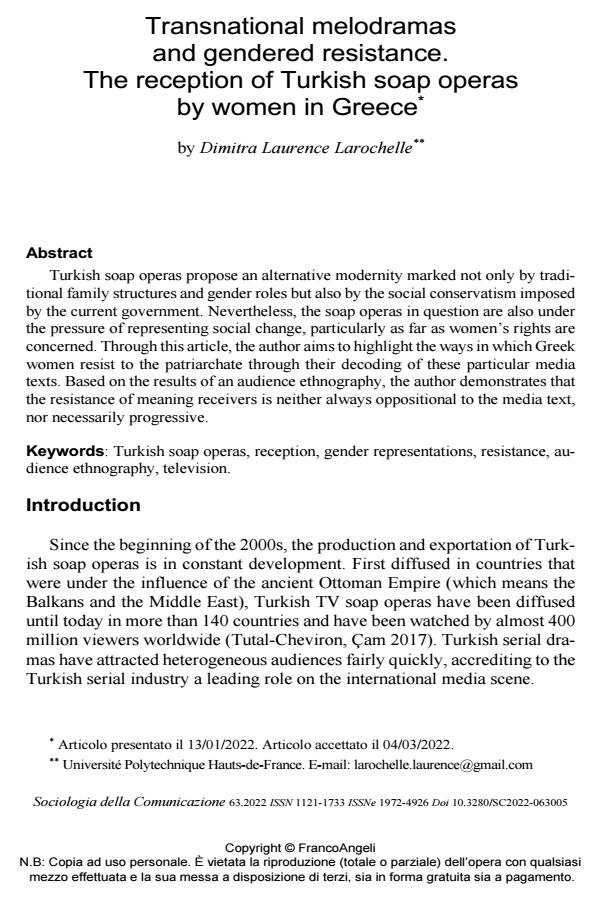Transnational melodramas and gendered resistance. The reception of Turkish soap operas by women in Greece
Titolo Rivista SOCIOLOGIA DELLA COMUNICAZIONE
Autori/Curatori Dimitra Laurence Larochelle
Anno di pubblicazione 2022 Fascicolo 2022/63
Lingua Inglese Numero pagine 18 P. 76-93 Dimensione file 333 KB
DOI 10.3280/SC2022-063005
Il DOI è il codice a barre della proprietà intellettuale: per saperne di più
clicca qui
Qui sotto puoi vedere in anteprima la prima pagina di questo articolo.
Se questo articolo ti interessa, lo puoi acquistare (e scaricare in formato pdf) seguendo le facili indicazioni per acquistare il download credit. Acquista Download Credits per scaricare questo Articolo in formato PDF

FrancoAngeli è membro della Publishers International Linking Association, Inc (PILA), associazione indipendente e non profit per facilitare (attraverso i servizi tecnologici implementati da CrossRef.org) l’accesso degli studiosi ai contenuti digitali nelle pubblicazioni professionali e scientifiche.
Turkish soap operas propose an alternative modernity marked not only by tra-ditional family structures and gender roles but also by the social conservatism im-posed by the current government. Nevertheless, the soap operas in question are also under the pressure of representing social change, particularly as far as wom-en’s rights are concerned. Through this article, the author aims to highlight the ways in which Greek women resist to the patriarchate through their decoding of these particular media texts. Based on the results of an audience ethnography, the author demonstrates that the resistance of meaning receivers is neither always op-positional to the media text, nor necessarily progressive.
Parole chiave:Turkish soap operas, reception, gender representations, resistance, au-dience ethnography, television.
- Transnational soap operas and viewing practices in the digital age: The Greek fandom of Turkish dramas Dimitra Laurence Larochelle, in International Communication Gazette /2023 pp.233
DOI: 10.1177/17480485221151116 - Identité culturelle, culture populaire et résistance : la réception des feuilletons turcs par les publics grecs Dimitra Laurence Larochelle, in Études de communication /2022 pp.77
DOI: 10.4000/edc.15177
Dimitra Laurence Larochelle, Transnational melodramas and gendered resistance. The reception of Turkish soap operas by women in Greece in "SOCIOLOGIA DELLA COMUNICAZIONE " 63/2022, pp 76-93, DOI: 10.3280/SC2022-063005